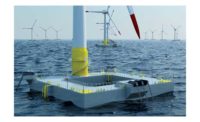Wastewater Microtunnel Sets Record
Geography and time weren’t on the side of Mortenson when it needed to design and build a new siphon to move 22 million gallons of wastewater as part of an upgrade to a 42-year-old water system in Oregon.
Clean Water Services, the water resources management utility in Washington County, Ore., needed to improve capacity on a “just-in-time basis” as growth threatened the viability of the wastewater system. The agency sidestepped a traditional design-bid-build method for a progressive design-build effort on a $34-million Tualatin Interceptor and Siphon Improvements project that includes an 84-in.-dia, vertically curved 470-ft-long microtunnel under the Tualatin River. The 650-ft-radius tunnel sets a North American record for the tightest curve radius at this diameter.
Based on geographical constraints, permitting restrictions and gravity-flow requirements, the team that included Kennedy Jenks landed on the microtunnel as the best solution, says Wade Denny, Clean Water Services project manager.
“We were really limited in space, and that drove the radius,” says Tom Paul, Mortenson general manager. “It was important to not have deep corners or large vertical rises.”
Traditionally, a tunnel is started at 0º, but due to the steepness, the new 115,000-lb, 43-ft-long Herrenknecht AVN 1800 machine launched at a 22º downward angle. Mortenson poured a grout curtain in front of the machine so it wouldn’t fall through as it laid pipe, advancing about 30 to 40 ft in a 12-hour day. The tunnel was then grouted in place.
With machines and materials coming from Malaysia, Switzerland and Germany, the nine-day drill by contractor Michels came out within 1 in. of vertical and horizontal tolerances, a “phenomenal” result, Paul says.
The collaborative delivery helped speed the effort when acquiring the proper state and federal permits to finish a project that included a jack-and-bore process under six acres of wetlands, Denny says. With the tunneling complete, construction of the piping will finish by January 2020 and the system will be complete by early 2021, a full 24 months faster than with a traditional contracting method.
Dean Wood, Kennedy Jenks vice president, says, “Everyone had their innovation hats on.”



